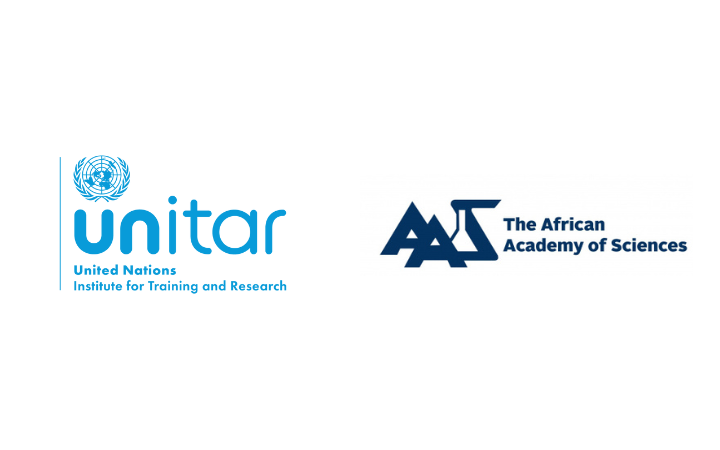Science4Peace (S4P) Africa is the flagship initiative of the newly established partnership between the African Academy of Sciences (AAS) and the United Nations Institute for Training and Research (UNITAR), Division for Peace.
With conflicts threatening the stability and social-economic development of communities across the continent and around the world, this initiative centred on strengthening peaceful, just, healthy and sustainable communities in Africa through scientific cooperation, is more timely than ever. Scientific cooperation in service to meeting community challenges is crucial for stabilising conflict-affected areas and improving the well-being of affected populations through effective sustainable development strategies.
The Science4Peace Africa Initiative aims to transform the role of science in building sustainable peace by leveraging the unique strengths of the AAS and UNITAR. Blending science diplomacy, interdisciplinary research, capacity building and science-society partnerships, S4P aims to address the root causes of conflict and promote inclusive development across Africa, ensuring that the benefits of scientific research, teaching and innovation–whether in health, technology, agriculture, energy, culture, education or policy—extend equitably to all of society.
While Science4Peace has traditionally focussed on supporting conflict early-warning systems, global inequalities and crises now demand broader engagement, leveraging all scientific fields in order to transform conflict drivers through co-creating innovative solutions that support sustainable peace.
By fostering inclusivity, conflict-sensitivity, interdisciplinarity, innovation, and whole-of-society approaches, the S4P initiative will empower African scientists and institutions to champion new and impactful solutions to regional challenges such as climate change, resource scarcity, community security, and health crises, positioning Africa as a global leader in harnessing science for peace.
Conflict: A Barrier to Global Scientific Cooperation and to Sustainable Development in Africa
Conflict, whether armed or social, presents the greatest barrier to effective scientific cooperation and the achievement of the Sustainable Development Goals. When regions are destabilised, research is often interrupted, resources diverted, partnerships falter, and knowledge exchange and innovation uptake come to a halt. This disruption disproportionately affects developing nations and vulnerable populations.
When the benefits of science do not reach the communities that need it most, frustrations grow over unmet needs resulting from poor and unequal development. Across Africa, a gulf remains between siloed scientific research and the needs of economically and politically marginalised populations. Hindered by political conflicts within and across borders, scientific cooperation on the continent remains limited. Together with poor resource management and ineffective conflict resolution strategies, ongoing conflicts are thus exacerbated. Yet, effective scientific collaboration is crucial for addressing shared challenges such as water scarcity and health crises, which are often at the heart of conflicts in the region. This requires an enabling policy environment, free from partisan political interests.
Equally important is a shift in the culture and orientation of scientific cooperation. University lecturers and researchers who are highly specialised in their fields may believe that issues of conflict and peace are irrelevant to their work and that they have no role to play in peacebuilding. And yet, research, innovation and teaching can reinforce conflict drivers when not developed in a conflict-sensitive way and when not oriented towards peacebuilding outcomes.
For younger researchers, it is important to recognize that the pursuit of science is never truly “neutral”. Scientific investment remains inequitable and is thus biased, and so are the benefits of science when not aligned with frameworks that prioritise inclusivity, sustainability and peacebuilding.
Project Scope
To address these challenges, the Science4Peace Africa Initiative led by UNITAR and the African Academy of Sciences will build capacity to improve the conflict-sensitivity and transformative impact of interdisciplinary, multi-sectoral, science and society partnerships, thus strengthening the role of science in supporting inclusive, contextually relevant, community-centred, and sustainable peacebuilding across Africa.
In collaboration with key stakeholders, the multi-year S4P Africa Initiative aims to achieve the following outcomes:
- Outcome 1: Strengthened Capacity for Peace-Oriented Science
- Outcome 2: Evidence-Based Science4Peace Policymaking and Investment
- Outcome 3: Increased Interdisciplinary and Cross-Sectoral Collaboration in Support of Peace
- Outcome 4: Increased Science-Society Partnerships in Support of “Peacebuilding Dividends”
- Outcome 5: Shift in Culture of Scientific Cooperation towards Peacebuilding
- Outcome 6: Global Visibility and Advocacy for Science4Peace
For more information, please contact:
Dr. Jon-Hans Coetzer
Senior Programme Specialist - Capacity Development, Training and Research
UNITAR, Division for Peace, Bonn


